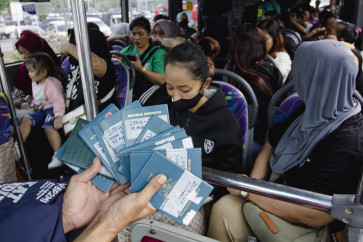Popular Reads
Top Results
Can't find what you're looking for?
View all search resultsPopular Reads
Top Results
Can't find what you're looking for?
View all search resultsTick, cross or punch, voters can choose whatever they like
The General Elections Commission (KPU) plans to revise its ballot marking regulations which will allow voters to tick, cross or punch their choice of party or candidate in the upcoming elections
Change text size
Gift Premium Articles
to Anyone

T
he General Elections Commission (KPU) plans to revise its ballot marking regulations which will allow voters to tick, cross or punch their choice of party or candidate in the upcoming elections.
KPU member Andi Nurpati said the regulation needed to be looked at again following revelations many voters did not understand the current process. With just over two months until the legislative elections, surveys have found voters are still used to the old system which only required them to tick or punch ballot papers on the party symbol or candidate name.
“The KPU has decided to revise the ballot marking regulation because during a series of election simulation exercises recently, many voters demonstrated they were more familiar with using a cross or dash to indicate their vote,” Andi told a hearing at the House of Representatives’ Commission II overseeing home affairs Monday.
The commission organized the latest practise drill in Tangerang, west of Jakarta, on Saturday. Some of the voters invited to the election trial opted to cross their ballot paper while making a mock vote, despite being instructed beforehand to tick the forms.
Mock elections held in Papua, Surabaya and Aceh revealed similar results, leading to the KPU calling for the introduction of the tick and punch system.
The next trials have been arranged in the North Sulawesi capital of Manado, South Sulawesi capital of Makassar, West Nusa Tenggara capital of Mataram, Yogyakarta, the Riau capital of Pekanbaru, Batam Island and the East Kalimantan town of Balikpapan later this month.
House lawmakers expressed discontent with the KPU for being inconsistent with its ballot marking regulation and also for running a public campaign about the election which had failed to reach many people in rural areas.
“If the regulation changes every time you organize an election trial, who will know when the final decision will be made?,” senior Golkar Party politician Ferry Mursyidan Baldan said.
“You don’t need to wait for a ‘government regulation in-lieu-of law’ to make a decision.”
Andi said the KPU was expecting such a regulation to allow voters to mark a ballot twice.
The proposed regulation states that voters can tick the ballot sheet twice, both on the political party’s logo and the number indicating the legislative candidate if the wish.
Article 176 of the 2008 election law however states a ballot is
only considered valid if the voter marks either the candidate’s name or their party.
“If the government does not agree with the regulation, then we will issue the revised regulation regarding the correct voting method this week,” Andi said.
“Without the regulation, voters can only mark a ballot once, but we will ask for it to be considered valid if they mark it twice,” she said.
In the 2004 elections, voters were allowed to mark ballots twice.
Legislators are also at odds over the much-debated female quota in legislative elections, with some lawmakers backing a KPU move to increase female representation in the House.
“I support this move by the KPU, particularly because there is no
need for the government to issue a regulation,” Lena Maryana Mukti of the United Development Party (PPP) said.
Ferry strongly rejected the plan, saying a quota on the number of female candidates would interfere with the elections law, which regulates the number of legislative candidates listed in the election.
The KPU said it wanted to delegate one seat to a female candidate out of every three won by a party.









